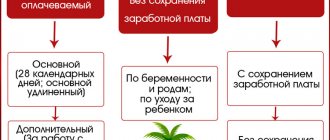Types of compensation payments under Labor Code
The Labor Code of the Russian Federation distinguishes between ordinary compensation payments and payments of a compensatory nature. The first includes funds that are not included in the worker’s salary. Most often they are paid once or over a short period of time. These include (the list of circumstances is listed in the Labor Code of the Russian Federation, namely in Article 165):
- annual vacation payments;
- travel payments;
- compensation in connection with moving to another locality or locality to perform work duties;
- funds paid to employees of budgetary institutions or private individuals for the performance of public or state duties;
- payments to students forced to combine education with work;
- payments in connection with the voluntary dismissal of an employee or due to the fault of the employer (for example, simple or intentional failure to issue a work book to an employee).
Public or government duties include becoming a donor, serving on a jury, or serving on an election committee. If it is necessary to carry them out, the employer must temporarily release the worker from his main job.
Compensatory payments include:
- additional payment for work in areas characterized by harsh weather conditions;
- for carrying out harmful, difficult or dangerous activities;
- deductions for citizens working multiple jobs, working overtime, and also working night shifts;
- payments for work with state codes and information that constitutes the state. secret.
These payments are considered salary supplements. Their presence is enshrined in Chapter 21 of the Labor Code “Wages” and in certain laws (for example, guarantees for residents and workers in the Far North and similar territories are enshrined in Law No. 4520-1 of 1993).
All of the above compensation is provided to employees at the expense of the employer. Legal norms apply to workers both in private enterprises and in budgetary institutions in 2020.
Additional pay for work in dangerous or harmful conditions
Employees who perform their work duties in dangerous or harmful conditions are entitled to an increase in wages (Articles 146 and 147 of the Labor Code of the Russian Federation). Such compensation is not established provided that the working conditions in question are recognized as safe according to the results of a special assessment or the conclusion of the relevant state examination (Article 219 of the Labor Code of the Russian Federation).
Employees retain their right to receive increased wages if this is confirmed by the results of workplace certification, which was carried out before the introduction of a special assessment of working conditions by Federal Law 426, i.e. before January 1, 2014.
The employer has the right not to apply a special assessment at those workplaces where certification was carried out, from the date of completion of which more than five years have passed. As an exception, there are cases provided for in Article 17 of Federal Law No. 426. The minimum increase in wages when carrying out work in hazardous or harmful conditions is equal to 4% of the salary (tariff rate) established for performing various types of work under normal working conditions.
How is labor paid when performing work in areas with special climatic conditions? Such work of employees is subject to payment at an increased rate (2nd part of Article 146 of the Labor Code of the Russian Federation). In accordance with Article 148 of the Labor Code of the Russian Federation, labor activity in these areas is paid in a manner and in amounts that cannot be lower than those established by labor legislation or other legal acts.
In particular, the labor of citizens working:
- in the regions of the Far North and localities equivalent to them, regional coefficients and percentage increases in wages are applied (Article 315 of the Labor Code of the Russian Federation);
- in desert, high mountain, and waterless areas, the corresponding salary coefficients established by regulations are applied.
Percentage allowances and coefficients for work in special climatic conditions are included in the wages, which the enterprise is obliged to pay in full.
Those citizens who work part-time in such areas and localities, as well as citizens who go there to work on a rotational basis, can also apply for a salary taking into account the specified allowances and coefficients.
How is labor paid when performing work of varying qualifications? In accordance with Article 150 of the Labor Code of the Russian Federation, for workers with piecework and time-based wages, different payment procedures are provided for when carrying out work of different qualifications.
Namely:
- performance of labor duties with time wages is paid as work of a higher qualification;
- performance of labor duties with piecework payment is paid according to the rates of the work performed;
- When carrying out assignments that are paid below the rank assigned to the employee, the difference between ranks is compensated.
Additional payments in the field of education
In addition to the above compensations intended for all employed citizens, there are separate payments to teaching staff.
- For performing the functions of a class teacher. The size of the additional payment to the teacher’s salary is fixed, established by Decree of the Government of the Russian Federation No. 850 of 2005. It is 1,000 rubles.
- To receive housing out of turn or to pay for living in rural areas or urban settlements. The right to receive funds for these purposes is enshrined in Art. 47 of the Law “On Education in the Russian Federation” of 2012.
- For subscribing to periodicals and purchasing books. Only teaching staff with an academic degree can obtain it. Previously, in Law No. 3266-1 “On Education”, issued in 1992, the total amount of payments was 150 rubles. for university employees and 100 rubles. for teachers in other institutions. Now this money, according to clause 11 of Art. 108 of Law No. 273-FZ “On Education in the Russian Federation” of 2012, are included in the salary supplement.
Additional remuneration may be established by the municipality or the management of the school, college, technical school or university.
Accrual procedure
The process of processing incentive payments goes through 4 stages:
- creation of a commission;
- analysis of the activities of a specific employee created by the commission;
- issuance of an order on bonuses;
- accrual of incentives in cash based on management orders.
The composition of the commissions that are created to resolve the issue of issuing incentive additional payments to employees is subject to separate requirements. These may include:
- team members (minimum 3 people);
- management of the organization;
- trade union member;
- one of the deputy heads of the enterprise.
The members of the commission are formed by voting of the entire team. The convened commission selects employees who are entitled to certain incentive additional payments. The meeting of the commission is confirmed by drawing up minutes. It is signed by all members of the commission. The protocol indicates:
- initials of professional workers who expect to receive incentive additional payments;
- amount of surcharge;
- initials and signature of all commission members;
- method of deciding on the payment of monetary incentives.
The decision to award bonuses to employees of an organization can be made in various ways. The most commonly used method is voting. The bonus is approved if more than half of the commission members vote for the employee. In other cases, the commission decides to award bonuses to the employee taking into account his personal work achievements.
The signed protocol with the decision on bonuses is subsequently transferred to management. Based on it, the manager issues an order to award a bonus to the employee. The order must contain:
- initials of the awarded employees, their position;
- Name of the organization;
- reasons for promotion;
- date of issue of the order;
- signature of the employer who issued the order.
Incentives are paid over different periods of time. They can be established for the previous month of the employee’s work, for the entire year of his work, or for the reporting period. In this case, monetary incentives can be accrued either as a separate payment or together with salary.
The procedure for calculating additional payments consists of creating a commission, considering the need for bonuses for the employee, drawing up a protocol and submitting it to management so that they can issue an order to pay a cash bonus.
Types of social compensation payments
In the social security system, the list of compensations is more extensive than in the labor sphere.
In 2021, there is no single regulatory act that would regulate all types of social benefits intended for various categories of citizens. They are contained in various laws, decrees, orders and regulations.
In 2021, social compensation includes:
- payments for caring for disabled (due to old age or incapacity) family members;
- financial assistance for caring for children under 3 years of age (paid to the mother, father or court-appointed guardian);
- compensation to military personnel (or their relatives if the military personnel died while performing official duties);
- payments for victims of natural and man-made disasters;
- payments for disabled people;
- financial assistance for people with forced migrant status;
- compensation for visiting Russian resorts or moving to cities in the European part of the Russian Federation for those living in the Far North.
Social benefits are financed from the regional or federal budget.
The list of payments is not permanent. The government or the president can approve new compensation if there is a need to support a specific segment of the population. Also, payments can be canceled if there are no financial resources in the budget or if they lose their relevance for society.
Amount of assistance for caring for a disabled person
In 2006, the President of the Russian Federation adopted Decree No. 1455, which stipulates that citizens are provided with compensation payments to care for disabled family members. The Decree includes:
- disabled people of group 1;
- old people whose age has exceeded 80 years;
- pensioners, provided that the medical commission considers constant household and medical supervision over them necessary.
The amount of financial assistance is 1200 rubles.
To receive money to care for a family member who is disabled, you do not have to be a close relative of this person. There is also no need to live together with a disabled person.
If parents have a disabled child who was assigned group 1 from birth, then financial assistance to the mother and/or father will be 5,500 rubles.
Compensation for caring for children under 3 years of age
The provision for payments to mothers, fathers or other relatives looking after children under 3 years of age is enshrined in Presidential Decree No. 1110, adopted at the end of May 1994.
Unfortunately, the amount of compensation is insignificant and amounts to only 50 rubles. Indexation by government authorities has not been carried out for over 20 years. The same Decree also establishes other categories of persons who can receive state assistance in the amount of 50 rubles. These are graduate students or students who were required to take academic leave due to health problems. Wives of military personnel living in settlements where they cannot find employment can also count on compensation.
Commercial organizations: how should they set premiums?
Here, bonuses are considered as payments in the nature of incentives. Each enterprise has the right to set specific sizes independently. It is enough to provide accurate information regarding accruals in collective or individual agreements and other similar regulations.
In addition, additional payments can be prescribed:
- In agreements signed with specific citizens.
- According to the text of the provisions on bonuses and standard remuneration for labor.
- Inside collective agreements.
- In other documents that play the role of regulations.
The manager is not expected to be reimbursed for expenses; he pays the money himself. It is allowed to take into account such expenses as part of remuneration. Then income taxes are calculated differently.
Setting additional payments is not a mandatory rule that applies to everyone. This is a chance for management to show initiative. And the amounts of remuneration are set depending on current needs and capabilities. If, according to the rules of the enterprise, bonuses exist, then they must be paid; refusal of bonuses will be illegal.
Typically, additional payments look like a percentage of the established salary. The time actually worked during the month is also taken into account. The payment is made for all periods during which the employment was valid.
5-30% of salary is the most common amount for compensation set by many companies. The money is paid at the same time as regular wages. But it is also permissible to change the frequency.
Payments to victims
Issues of social security for the population who have become victims of natural disasters are resolved at the federal level. In this case, the amount of payments is determined based on the damage actually suffered by people.
A separate issue is social payments in favor of victims of environmental disasters. In 2021, the classification of citizen victims is based on the list of man-made events that have occurred:
- Kyshtym tragedy in 1957;
- explosion at the Chernobyl nuclear power plant in 1986;
- work at a nuclear test site near Semipalatinsk.
People who in one way or another participated in these events receive compensation payments approved by Government Decree No. 136 of 2007.
About the procedure and calculation rules
In this case, you should rely on the following main points:
- Increases for length of service must be monthly.
- Determination of official salary for time actually worked.
- If a part-time scheme is used, only the rate at the main place of work is taken into account.
- When the right to a bonus appears, the first of them is accrued for the period that will be worked out after the appearance of this right.
- If the accounting period is a month, then payments are made separately.
- Typically the standard payment period is one month. But rewards that come once a year are convenient for commercial enterprises.
Help for internally displaced persons
People who have become internally displaced persons are also entitled to money from the state. These include citizens who left their homes due to fear of committing acts of violence against them or against their families, persecuted for belonging to a particular nationality, social group, religion, or for supporting specific political beliefs.
Financial assistance for such people is regulated by Law No. 4530-1 “On Forced Migrants,” adopted in 1993. They are entitled to compensation:
- to pay for travel by car, railway and air transport, including luggage (if the refugee is low-income);
- for registration of documents in a new place of residence;
- in the housing sector (for example, for obtaining a residence permit in a specific territory, assistance with obtaining temporary housing).
Migrant status is assigned at Russian consulates or the Ministry of Internal Affairs.
Unfortunately, not all compensation payments existing in the Russian Federation in 2020 provide significant assistance to the population. It is necessary to introduce a legislative initiative to index certain types of financial assistance (for example, payments to parents looking after children under 3 years of age). Labor compensation in Russia is more regulated by law than social compensation. In addition, the amount of additional labor payments is higher.









